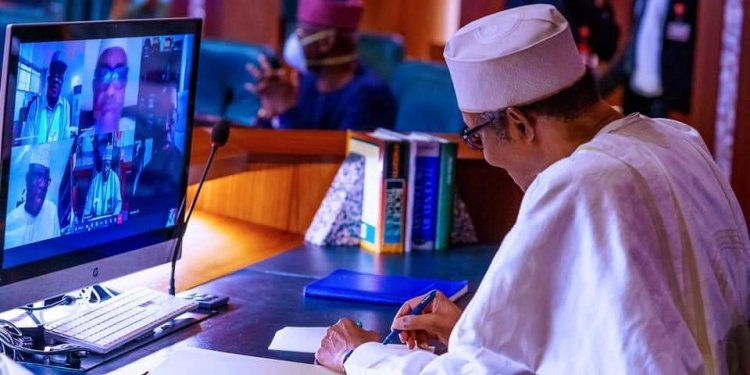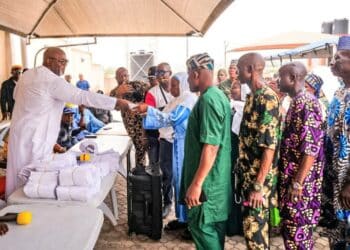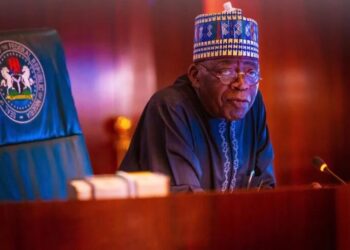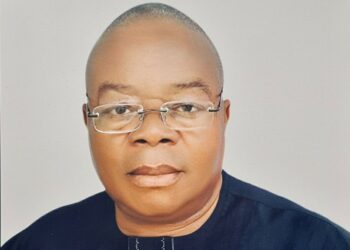The Federal Government on Wednesday approved a $1,959,744,723.71 contract for a rail line that would link Nigeria to the Niger Republic.
The approval was given at a meeting of the Federal Executive Council presided over by President Muhammadu Buhari.
The Minister of Transportation, Rotimi Amaechi, told State House correspondents at the end of the meeting that the money approved for the development of the proposed rail line linking Kano-Dutse-Katsina-Jibia and to Maradi in the Niger Republic was inclusive of Value Added Tax.
The rail line is designed to connect three Northern states – Kano, Katsina and Jigawa states – as well as seven senatorial districts.
The 248-kilometre line is expected to aid the transportation of crude oil.
But the opposition Peoples Democratic Party (PDP) and some civil rights groups took a swipe at the Buhari regime, saying the project was a misplacement of priority in a country facing intractable problems of insecurity and harsh economic conditions arising from hikes in fuel price and electricity tariff.
Besides the rail project, Amaechi disclosed the council also approved the award of a contract worth N3.049bn for the design, manufacture, supply, testing and inauguration of one railway crane for the purposes of clearing rail tracks during accidents.
The minister said, “The first approval for our ministry is the award of contract for the design, manufacture, supply, testing and inauguration of one railway crane of 150-ton capacity for emergency and recovery of rolling stocks.
“This is to sort out situations of an accident on the track. It is for a total cost of N3,049,544,000.
“The second one is the award of contract for the development of the proposed Kano-Katsina-Jibia to Matadi rail line in the Niger Republic and to Dutse, the capital of Jigawa, for a total cost of $1,959,744,723.71, inclusive of 7.5% VAT.”
Meanwhile, the Minister of Niger Delta Affairs, Godswill Akpabio, said the council also approved N745.2m to be spent on engaging additional forensic auditors for the Niger Delta Development Commission.
The minister said the approval brought the total number of forensic auditors engaged for the commission to 16.
He explained that they would be working with the lead forensic auditor in nine states of the Niger Delta which he said had been divided into 16 lots.
“The council also considered and approved the need to attach relevant investigative security agencies to each of the team to ensure transparency and also to be sure that whatever comes out is acceptable to not just in Nigeria but to the international community,” the minister added.
The Minister of Works and Housing, Babatunde Fashola, said the council approved N12.088bn for the construction of Section II of the Ohafia-Arochukwu Road.
“This section comprises Umuahia/Bende/Ohafia Road in Abia State and it was approved for the construction at N12.088bn comprising a distance of 45 kilometres to complement Section I which was previously awarded in 2018, that is the section from Bende/Arochukwu to Ohafia which is 19.27 kilometres,” he said.
The Minister of Information and Culture, Lai Mohammed, said the council approved the augmentation of the contract for the construction of the Petroleum Technology Development Fund’s headquarters in Abuja in the sum of N3.773bn, therefore raising the initial approval for the contract to about N14bn.
Mohammed added that FEC also approved the procurement of 1,800 units of laptop computers for three Nigeria Customs Service’s training schools at the cost of N351,540,000.
He disclosed that the council also approved N197million for the expansion of the NCS’ cash management’s software in compliance with International Public Sector Accounting Standards.
He said the software, when installed, would enhance the efficiency of the Department of Customs.
The Minister of Interior, Rauf Aregbesola, said FEC approved the contract for the procurement of 52 Green Maria vehicles for the Nigeria Correctional Service.
He said the vehicles would complement the about 451 already acquired between 2016 and 2019. The minister did not disclose the cost of the contract.
Buhari’s regime has never got his priorities right – PDP
The Federal Government’s decision to approve $1.96bn for the construction of a rail line linking Nigeria to the Niger Republic attracted criticisms on Wednesday.
The PDP described the decision as another proof of the misplacement of priorities by the President.
The National Publicity Secretary of the PDP, Kola Ologbindiyan, in a telephone interview with The PUNCH, in Abuja, stated, “The problem of this regime is that it has never got its priorities right and at the end of the day, Nigerians are the ones who suffer from these poor choices by these people.
“Let’s even look at it from the point of view of the economy. What is the economic benefit of this project to Nigeria? The Nigerian economy, as it is today, is not in a state to contain this kind of wasteful spending.”
Attempts to get a response from the spokesperson for the All Progressives Congress, Yekini Nabena were unsuccessful. Calls to his mobile telephone indicated that he was unreachable. A response to a text message sent to him was still being awaited as of the time of filing this report. 8:11 pm.
But a former President of the Committee for the Defence of Human Rights, Malachy Ugwummadu, said the project was a misplacement of priority.
In an interview with one of our correspondents, Ugwummadu said, “It is a misplacement of priority and insensitivity to the needs and plight of the people by a government that faces imminent and impending strike action by the organised labour centres and civil society partners in response to their illegal and obnoxious increases in the prices of petroleum commodities, the hike in electricity tariff and VAT, all within the devastating COVID-19 period.”
The Convener of the Concerned Nigerians Group, Deji Adeyanju, told The PUNCH, that the project was meant to loot the resources of Nigeria.
Adding that the project was not economically viable he asked, “What is the Kaduna-Abuja rail project generating? Imagine we take a loan from China to construct a rail line that passes through Katsina State to another country; for what purpose?
“Lagos that has been battling gridlock for many years. Imagine what would happen if there is an intra-city rail. You can imagine its impact and monthly billions it will generate.”
We need more infrastructure within Nigeria – ex-ANAN president
On his part, a former President of the Association of National Accountants of Nigeria, Dr Sam Nzekwe, wondered who would pay for the part that leads to Niger.
He said, “There is so much infrastructural deficit in Nigeria, and part of the reasons we are not having many investors in the country is lack of critical infrastructure.
“Government would have used more efforts to develop infrastructure in Nigeria.”
While wondering what the rationale behind the project could be, he said, “One would have said by now we should be talking of how to build solid roads and the rail system in Nigeria very well.
“But sometimes, I don’t know if we are getting our priorities right because I think we have to finish with Nigeria before you think of going to Niger. Is there any special thing we are getting from Niger?”
Akinterinwa asks govt to explain funding
A former Director-General of the Nigerian Institute for International Affairs, Prof Bola Akinterinwa, said Nigerians should be more interested in the source of the fund for the project.
Akinterinwa, in a telephone conversation with one of our correspondents, said in the light of the global economic crisis, the country could not single-handedly finance such a project.
He said, “There is absolutely nothing wrong if there is a railway line from the northern part of the country to our northern neighbour, Niger if the funding is going to be at the level of the two countries. Second, if it is within the framework of ECOWAS regional development. Third, if there is international funding for it under international assistance. So, one cannot just make a conclusion without first addressing under which framework it will be done.
.“So, there is no way that kind of project will not be within that (joint) framework. But the issue is to find out the funding. Like a Yoruba, the proverb says, ‘whoever is going to help an outsider, must have succeeded in helping himself first.”
Govt must explain rationale for project—Utomi
A political economy and management expert, Pat Utomi, in an interview with The PUNCH, said the government had to explain the rationale for its decision to approve the development of the rail line.
He said, “The first question, you ask is which is the most commercial axis in the country that needs rail service? In my view, by far the commercial axis is the Lagos-Benin-Onitsha-Port Harcourt-Calabar corridor. That is the busiest commercial track in the country
“In terms of use, that is the heaviest use traffic that requires rail transportation. But those who make the decisions must understand what drives their own priorities. This is the priority I would choose. But I am not sure what is the basis that forms the government’s choice
“If there is a regional decision to link the countries of the sub-region and there is a rationale justifying it, say for example produce-aggregation across borders. I can understand that, but everyone must be made to understand what produce is being aggregated on the Kano-Dutse-Katsina-Jibia-Maradi route
“I have no problem with cross border traffic if it can be justified on a produce-aggregation level for example a corridor for cotton or something which can have an economic impact. But if it does not, then clearly the judgment of those who are doing the allocation has to be questioned by the people.”










